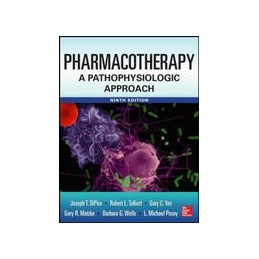- Obniżka


 Dostawa
Dostawa
Wybierz Paczkomat Inpost, Orlen Paczkę, DHL, DPD, Pocztę, email (dla ebooków). Kliknij po więcej
 Płatność
Płatność
Zapłać szybkim przelewem, kartą płatniczą lub za pobraniem. Kliknij po więcej szczegółów
 Zwroty
Zwroty
Jeżeli jesteś konsumentem możesz zwrócić towar w ciągu 14 dni*. Kliknij po więcej szczegółów
A Doodys Core Title for 2015!
THE LANDMARK TEXT ON HOW TO ACHIEVE OPTIMAL PATIENT OUTCOMES THROUGH EVIDENCE-BASED MEDICATION THERAPY
Pharmacotherapy:: A Pathophysiologic Approach is written to help you advance the quality of patient care through evidence-based medication therapy derived from sound pharmacotherapeutic principles. The scope of this trusted classic goes beyond drug indications and dosages to include the initial selection, proper administration, and monitoring of drugs. You will find everything you need to provide safe, effective drug therapy across the full range of therapeutic categories.
This edition is enriched by more than 300 expert contributors, and every chapter has been revised and updated to reflect the latest evidence-based information and recommendations. Important features such as Key Concepts at the beginning of each chapter, Clinical Presentation tables that summarize disease signs and symptoms, and Clinical Controversies boxes that examine the complicated issues faced by students and clinicians in providing drug therapy make this text an essential learning tool for students, patient-focused pharmacists, and other health care providers.
NEW TO THIS EDITION::
Opis
Foundation Issues
Web 1. Health Literacy
Web 2. Cultural Competency
Web 3. Medication Safety
Web 4. Evidence-Based Medicine
Web 5. Pharmacokinetics
Web 6. Pharmacogenetics
Web 7. Pediatrics
Web 8. Geriatrics
Web 9. Pallative Care
Web 10. Clinical Toxicology
Web 11. Biological Terrorism
Web 12. Chemical and Radiological Terrorism
Diseases
Web 13. Pulmonary function Testing
Web 14. Drug-Induced Pulmonary Disease
Web 15. Evaluation of the Gastrointestinal Tract
Web 16. Drug-Induced Liver Disease
Web 17. Quantification of Renal Function
Web 18. Evauation of Neurological Illness
Web 19. Evaluation of Psychiatric Illness
Web 20. Function and Evaluation of the Immune System
Web 21. Allergic and Pseudolallergic Drug Reactions
Web 22. Disorders and Skin Cancer
Web 23. Drug-Induced Hematologic Disorders
Web 24. Pharmacotherapy
Cardiovascular Disorders
1. Cardiovascular Testing
2. Cardipulmonary Arrest
3. Hypertension
4. Systolic and Diastolic Heart Failure
5. Acutely Decompensated heart Failure
6. Ischemic Heart Disease
7. Acute Coronary Syndromes
8. Arrhythmias
9. Venous Thromboembolism
10. Stoke
11. Hyperlipidemia
12. Peripheral Arterial Disease
13. Shock
14. Hupovolemic Shock
Respiratory Disorders
15. Asthma
16. Chronic Obstructive Pulmonary Disease
17. Pulmonary Artery Hypertension
18. Cystic Fibrosis
Gastrointestinal Disorders
19. Gastroesophageal Reflux Disease
20. Peptic Ulcer Disease
21. Inflammatory Bowel Disease
22. Nausea and Vomiting
23. Diarrhea, Constipation, and Irritable Bowel Syndroms
24. Portal Hypertension and cirrhosis
25. Pancreatitis
26. Viral Hepatitis
27. Celiac Disease
Renal Disorders
28. Acute Renal Failure
29. Chronic Kidney Disease:: Progression-Modifying Therapies
30. Hemodialysis and Peritoneal Dialysis
31. Drug-Induced Kidney Disease
32. Glomerulonephritis
33. Drug Therapy Individualization for Patients with Renal Insufficiency
34. Disorders of Sodium and water Momeostasis
35. Calcium and Phosphorus Homeostatis
36. Potassium and Magnesium Homeostasis
37. Acid-Base Disorders
Neurologic Disorders
38. Alzheimers Disease
39. Multiple Sclerosis
40. Epilepsy
41. Status Epilepticus
42. Acute Managment of the Brain Injury Patient
43. Parkinsons Disease
44. Pain Management and Palliative Care
45. Headache Disorders
Psychiatric Disrorders
46. Attention-Deficit/Hyperactivity Disorder
47. Eating Disorders
48. Stimulants, and Hallucinogens
49. Caffeine
50. Schizophrenia
51. Depressive Disorders
52. Bipolar Disorder
53. Anxiety Disorders I. Generalized Anxiety Disorder, Panic, and Social Anxiety Disorders
54. Anxiety Disorders II. Posttraumatic Stress Disorder and Obcessive-Compulsive Disorder
55. Sleep Disorders
56. Developmental Disabilities
Endocrinologic Disorders
57. Diabetes Mellitus
58. Thyroid Disorders
59. Adrenal Gland Disorders
60. Pituitary Gland Disorders
Gynecologic and Obstetric Disorders
61. Pregnancy and Lactation
62. Contraception
63. Menstrual-Relanted Disorders
64. Endometriosis
65. Hormone Therapy in Women
Urologic Disorders
66. Erectile Dysfunction
67. Benign Prostatic Hyperplasia
68. Urinary Incontinence
Immunologic Disorders
69. Systemic Lupus Erythematosus
70. Solid Organ Transplantation
Rheumatologic Disorders
71. Osteoarthritis
72. Rheumatoid Arthritis
73. Osteoporosis and Osteomalacia
74. Gout and Hyperuricimia
Ophthalmic and Otolaryngological Disorders
75. Glaucoma
76. Allergic Rhinitis
Dermatologic Disorders
77. Acne Vulgaris
78. Psoriasis
79. Atopic Dermatitis
Hematologic Disorders
80. Anemias
81. Coagulation Disorders
82. Sickle Cell Anemia
Infectious Diseases
83. Antimicrobial Regimen Selection
84. Central Nervous System Infections
85. Lower Respiratory Tract Infections
86. Upper Respiratory Tract Infections
87. Influenza
88. Skin and Soft Tissue Infections
89. Infective Endocarditis
90. Tuberculosis
91. Gastrointestional Infections and Exterotoxigenic Poisonings
92. Intra-abdominal Infections
93. Parasitic Diseases
94. Urinary Tract Infections
95. Sexually Transmitted Diseases
96. Bone and Joint Infections
97. sepsis and Septic Shock
98. Superficial Fungal Infections
99. Invasive Fungal Infections
100. Infections in Immunocompromised Patients
101. Antimicrobial Prophylaxis in Surgery
102. Vaccines, Toxoids and Other Immunobiologics
103. Human Immunodeficiency Virus
Oncologic Disorders
104. Cancer Treatment and Chemotherapy
105. Breast Cancer
106. Lung Cancer
107. Colorectal Cancer
108. Prostate Cancer
109. Lumphomas
110. Ovarian Cancer
111. Acute Leukemias
112. Chronic Leukemia
113. Multiple Myeloma
114. Myelodysplastic Syndromes
115. Renal Cell Carcionoma
116. Melanoma
117. Hematopoietic Stem Cell transplantation
Nutritional Disorders
118. Assessment of Nutrition Status and Nutrition Requirements
119. Parenteral Nutrition
120. Enteral Nutrition
121. Obesity
